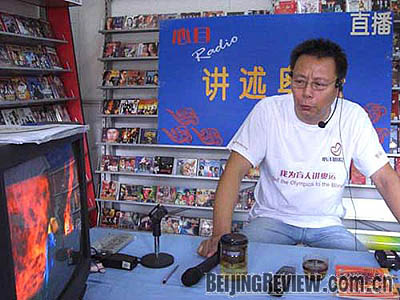|
It is also the coordinator of the radio summer camp that Song joined.
The organizer of the camp was Beijing Hong Dandan Edu-Culture Communication Center (shorter as Hong Dandan), set up by Zheng Xiaojie in July 2003, a non-profit organization providing training courses on media production and barrier-free communication for the visually disabled.
Their service program includes the "Eyes of Heart Cinema", a party-like movie lecture on Saturday; "Seeing the World via Eyes of Heart", a 50-minute weekly radio program consisting of "Eyes of Heart Cinema" movie narrative and "Interviews"; training sessions for radio professionals; psychological lectures, and so forth.
Song's current work is to edit the introduction part of the movie narration section.

Wang Weili, the movie narrator since 2005 (Photo by CHEN RAN)
According to Wang Weili, Zheng's husband, best known as "Da Wei", the movie narrator since 2005, the "Eyes of Heart Cinema" radio program is "a remedy for those visually disabled."
It traced back to 2004 when a couple with visual disabilities came to visit the Wangs. The Hollywood blockbuster Terminator was then aired on TV; Wang volunteered to be the movie narrator for the couple.
"It was not a well-done job, but they were so excited that they hugged me and held me up. The husband told me that he was totally shocked by the movie world that there seemed to be a door opened for him, a colorful new world," Wang recalls.
Inspired by the idea, Wang has put his heart into movie narration ever since. "The Eyes of Heart Cinema" formally launched in early 2005.
To create a better result, he would watch the movie at least three times and take notes before the lecture; he would invite healthy people to feel the way the handicapped "watch" the movie by covering their eyes.
"I'd like to let them enjoy the movie world by ears and the imagination; let them have a better understanding of the world they may not be able to see through the eyes. It is indeed a combination of the movie sound effects and my description about the scene, such as the location, the actor's emotional expression and appearance, the scenery, and so forth," said Wang, a former businessman who turned into a full-time volunteer of Hong Dandan in 2004.
"In the past, watching movies seemed to be a mission impossible for us. But now it's accessible. My horizon is broadened, thanks to the cinema," said Chen Guole, a male member of the audience.
"I would like to 'run' over here whenever the lecture begins," said Zhang Hui, another visually impaired audience member.
Over the past two years, the "Seeing the World via Eyes of Heart" radio program hit 100 episodes, reaching more than 750,000 people nationwide. The live movie narration has been watched by 3,356 people with visual disabilities, old patrons and new faces. In addition, some 768 volunteers from TV renowned comperes and movie professionals to white-collar clerks and university students, showed up to support; 214 people took movie narration training courses. Wang has been to neighboring cities to deliver live narrations for visually impaired locals.
"Mutual respect is the threshold of any rapport. Equality is a proper manner in communicating with the handicapped--to healthy people, the 'looking-down-upon-you' manner, which means treating them like children, doesn't help at all; to the handicapped, opening their hearts and facing themselves are challenges they have to come up against," Wang noted.
On August 8, 10 handicapped audiences listened to a live narration of the opening ceremony of the 29th Summer Olympic Games presented by Wang and his friend Cao Yinan, a compere from Beijing TV Station. It is reported that Wang will give live narrations for handicapped spectators after the 13th Paralympic Games kick off in Beijing on September 6.
The visually impaired, according to Wang, should have more career choices other than massage therapist.
It is exactly what Song wants to say.
"I'll become a full-time DJ someday," Song told Beijing Review. "I'll improve my interview skills; intensify my knowledge of radio programming; and practice my pronunciation. Although I could come over here only on the weekend as the first semester will be commenced soon, I'll keep going." | 
